Horse pulling returned as a feature event at this year's Grain Millers Harvest Showdown in Yorkton.
Jack Grad of Vibank was among the competitors in the Qu'Appelle Valley Horse Pulling Association sanctioned event. He said the return to Yorkton is a good one for pullers since it works as a warm-up to the big event at the Canadian Western Agribition.
"It's a good warm-up," he said, noting the sport is not new to Yorkton. "We used to pull here years ago."
Grad said the group, which has members from Melville to Lumsden, Regina and other communities in the region generally runs about 16 pulls a year, adding "this year we got rained out quite a bit."
For those unfamiliar with the sport of horse pulling, it is rather straight forward. A team of horses is hooked to a flat-bottomed sled and are required to pull it 14-feet for a full pull. Weight is added to the sled until a winner is determined based on the total weight pulled and the fraction of the 14-feet, if they do not complete a full pull.
Teams are divided into one of three categories, based on the total weight of the two horses, added Grad. Lightweight teams must weigh between 2,300 and 3,000 pounds. Middleweights are 3,001 to 3,500, and heavyweights are any team from 3,501 and up.
Grad himself said the lighweights are a favoured class.
"For me to watch the lightweight horses is more exciting," he said, although he tipped his hat to the biggest teams too. "There are teams that can start off a load of 11,000, or 12,000 pounds where the little guys can't do that."
At the same time the smaller teams generally eclipse the bigger horses in term of percentage of body weight pulled, said Grad.
"A real good lightweight team will pull three times their weight," he said. "It takes a tremendously good team, but its been done."
In Thursday's competition at the Farrell Agencies Arena Grad's team of Blackjack and Pearl, weighing 2,980-pounds pulled 6,500 the full 14-feet after which the teamster voluntarily withdrew from further competition.
Grad said to achieve the biggest pulls everything must fall into place, including the condition of the pulling surface.
"The ground condition here is good," he said. "The ground condition is a real big thing in how much you can pull."
As an example Grad noted, "In the Regina gumbo you can't pull a thing." He added this summer was a bad one for pulling in the sense the big weights squeezed water to the surface of outdoor tracks making it much harder to move the sled.
Grad said the breed of horse is a factor too. While teamsters turn to the big draft breeds for size and strength, not all draft horses are created equal.
For example, he said, "Clydesdales won't pull. If you're going to pull you're not going to pull Cyldesdales."
Grad himself pulls a Percheron team, although most of the 14-teams around the arena Thursday were of the Belgian breed.
"I hate to admit that these yellow ones, these Belgians are a bit stronger than the blacks (Percherons)," he said.
Of course it's not as simple as buying two horses and expecting them to be an effective pulling team.
Grad said the key is getting a team which works in tandem well, and it can take a long time to find a pair of horses which will do that.
"They've got to start together and want to pull together It's how many horses you've got to go through to get that team," he said.
And once a good team is matched, like any athletes they must train.
"You have to work the horses," said Grad. "If you want to keep them in shape you've got to get out and work them every day."
In Grad's case he hooks Blackjack and Pearl to a sled with 1,000 pounds on it and drives the team one-mile.
While there is work involved in training, and weekends away at competitions, Grad said most pullers have careers, С����Ƶ teamsters as a hobby.
In Grad's case he still farms, but has been pulling for about a decade-and-a-half. He said he has always worked with horses so the sport had a natural attraction for him.
"My grandfather and my dad always had horses and I've always driven and rode horses," he said. He added " I wouldn't have the patience to be a showman, all the cleaning and polishing (of harness)."
But horse pulling fits his interest.
"I like doing chores with them. I like working a team," he said.

.png;w=120;h=80;mode=crop)


